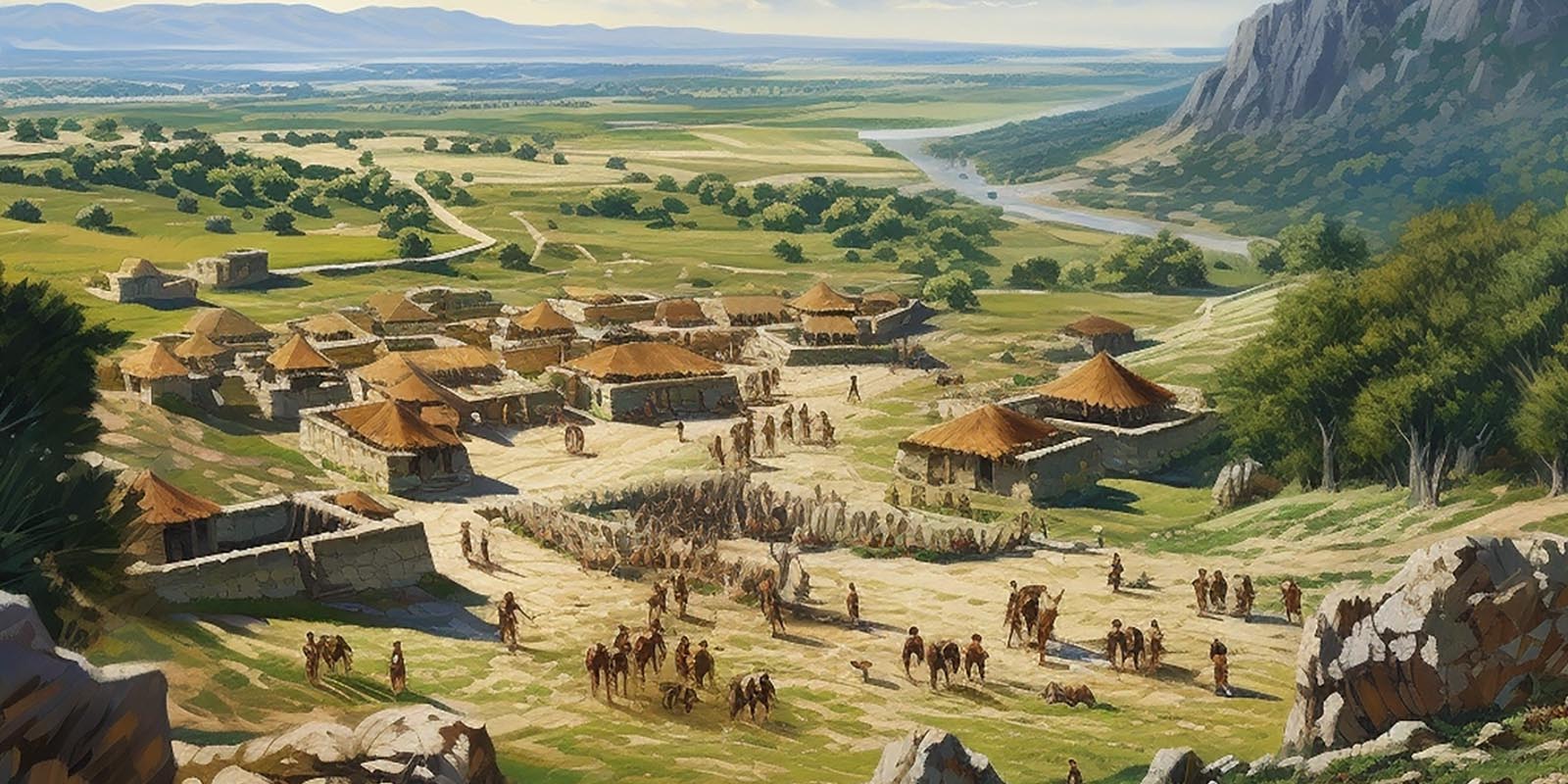

The Neolithic period in Greece, approximately spanning from 7000 to 3000 BCE, represents a transformative era marked by significant advancements in agriculture, settlement patterns, and the development of early forms of social organisation. Here is an overview of Neolithic Greece:
Transition to Agriculture: During the Neolithic, there was a shift from a hunter-gatherer lifestyle to settled agricultural communities. Early inhabitants began cultivating crops such as wheat and barley and domesticating animals like sheep, goats, and cattle.
Settlements and Architecture: Neolithic Greeks established permanent settlements, often situated near fertile land for agriculture. Houses were typically constructed using mudbrick, wattle, and daub techniques, featuring rectangular shapes with thatched roofs.
Tools and Technology: Neolithic communities in Greece developed a range of tools for agriculture and domestic activities. Stone tools, such as sickles for harvesting and grinding stones for processing grains, played a crucial role. Pottery also became more prevalent during this period.
Ceramics and Pottery: The Neolithic Greeks produced pottery for various purposes, including storage and cooking. Early ceramics were often plain, but as the period progressed, decorative elements such as incised patterns and impressions emerged.
Trade and Exchange: Neolithic communities engaged in local and regional trade, exchanging goods such as pottery, tools, and agricultural products. The development of trade networks contributed to cultural exchange and the sharing of technological innovations.
Social Organisation: Neolithic society saw the emergence of more complex social structures. The transition to agriculture and settled living likely led to the establishment of community leaders or elders responsible for organising communal activities.
Burial Practices: Burial practices became more elaborate during the Neolithic. Graves included offerings such as pottery, tools, and personal ornaments, suggesting a belief in an afterlife or spiritual significance associated with burial rituals.
Religious and Symbolic Practices: Neolithic communities in Greece demonstrated early religious and symbolic practices. Artefacts with zoomorphic and anthropomorphic features, as well as symbols associated with fertility, have been found in archaeological sites.
Thessalian Plain and Franchthi Cave: Notable Neolithic sites in Greece include the Thessalian Plain, where evidence of early farming communities has been discovered, and the Franchthi Cave in the Argolid region, which provides insights into the daily life of Neolithic inhabitants.
End of the Neolithic Period: The Neolithic period in Greece gradually gave way to the Bronze Age around 3200 BCE, marking another significant shift in material culture, technology, and social organisation.
The Neolithic period in Greece laid the foundations for settled agricultural communities and marked a crucial stage in the development of Greek civilisation. The advancements made during this era set the stage for the subsequent cultural and technological achievements that would define ancient Greece.
| Start Date | 6000 BC |
|---|---|
| End Date | 2900 BC |

Neolithic Greeks practiced an early form of dentistry, using tiny drills made of flint to treat tooth problems as far back as 7000 BCE
Ancient Greek art and architecture, with its harmonious proportions and timeless elegance, continue to inspire awe and admiration millennia later.
Discover
Greek mythology, a rich tapestry of gods, heroes, and mythical creatures, captivates the imagination with its tales of love, betrayal, and epic adventures that delve into the depths of the human psyche.
Discover
Ancient Greek history, marked by remarkable achievements in democracy, philosophy, and warfare, shaped the foundation of Western civilization, leaving an indelible legacy of innovation and cultural influence that continues to resonate to this day.
Discover
The ancient Greek Olympics, held in Olympia every four years, celebrated athleticism, unity, and cultural pride, serving as a testament to the enduring spirit of competition and excellence that transcends time and borders.
Discover
Ancient Greek wars, such as the Persian Wars and the Peloponnesian War, were pivotal conflicts that shaped the course of history, highlighting the struggle for power, independence, and the clash of civilizations in the ancient Mediterranean world.
Discover
Ancient Greek culture and society, characterized by its emphasis on art, philosophy, and civic engagement, fostered a vibrant intellectual and social landscape where innovation flourished, democracy thrived, and the pursuit of knowledge and excellence was celebrated as fundamental values of civilized life.
Discover
Find out more about ancientgreece.com